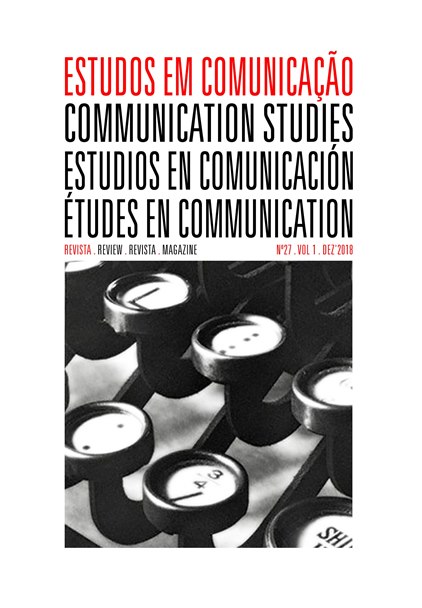Access and appropriation of journalistic news in social networks in Brazil: Refining the notion of “participation”
Keywords:
Journalism, social networks, issues of participation, new methods.Abstract
This article examines forms of appropriation and mediated deliberation of news on the page of the centennial Brazilian printed newspaper O Estado de S. Paulo accessed by the global social networking platform Facebook. The study discusses interaction among users from the point of view of the quality of participation, going beyond the practices of "liking" and "sharing" - understood in this study as trivial and convenient - based on news postings made by the newspaper. The category "comment" is used to enable more active and detailed participation, for the open space for exchanging public communication argued by reasons. A comparative corpus of analysis was selected in the months of October 2015 and October 2016, totaling 386 posts and 1,911 comments, in order to apprehend and differentiate valid and responsible participation models and levels capable of building and sustaining democratic and meaningful public debate. A qualitative analytical tool for debugging the comments is proposed, considering the troubled political context and its relationship with the dramatic economic recession in the country.
References
Carlson, M. & Lewis, S. (2015). Boundaries of journalism: Professionalism, practices and participation. London: Routledge.
Carro, R. (2016). Brasil. Digital News Report 2016 (pp. 82-83). Oxford: University of Oxford Press.
De Santi, A. (June 2015). O lado negro do Facebook. Revista Superinteressante, (348): 28-39.
Gillespie, T. (2014). The relevance of algorithms. In T. Gillespie, P. Boczkowski & K. Foot (eds.), Media technologies: essays on communication, materiality, and society (pp. 167-194). Cambridge, MA: MIT Press.
Gomes, W. (2014). Esfera pública política. In A. Citelli, C. Berger & M. A. Baccega, Dicionário de Comunicação: escolas, teorias e autores (pp. 221-229). São Paulo: Contexto.
Gomes, W. & Maia, R. (2008). Comunicação e democracia. São Paulo: Paulus.
Habermas, J. (1997). Direito e democracia. Rio de Janeiro: Tempo Brasileiro.
Harcup, T. & O’Neill, D. (2016). What is News? News values revisited (again), Journalism Studies. Doi: 10.1080/1461670X.2016.1150193
Hjarvard, S. (Jan-Jun de 2012). Midiatização: teorizando a mídia como agente de mudança social e cultural. Matrizes, 5(2): 53-91.
Jenkins, H. (Jan-Abr de 2016). Convergência e conexão são o que impulsionam a mídia agora. Entrevista concedidada a Priscila Kalinke e Anderson Rocha. Revista Brasileira de Ciências
da Comunicação – Intercom, 39(1): 213-219.
Johnson, T. S. (2015). Entre hard e soft news: explorando modelos de personalização de notícias em plataformas sociais. Lumina, 9: 1-18. Source: https://lumina.ufjf.emnuvens.com.br/lumi
na/article/view/479
Lorenz, M. (2014). Personalização: análise aos 6 graus. In J. Canavilhas, Webjornalismo: 7 características que marcam a diferença (pp. 137-145). Covilhã: Libros LabCom.
Mager, A. (2011). Algorithmic Ideology: how capitalist society shapes search engines. Conference paper for "A Decade in Internet Time"@OII. Oxford: Oxford. Accessed on December
, 2016, available at http://ssrn.com/abstract=1926244
Manovich, L. (1999). Database as symbolic form. Convergence: The International Journal of Research into New Media Technologies, 5(2): 80-99.
Martino, L. M. (2015). Teorias das mídias digitais. Petrópolis-RJ: Vozes.
Mitchell, W. & Hansen, M. B. (2010). Introduction. In W. J. Mitchell & M. B. Hansen, Critical terms for media studies (pp. vii-xxii). Chicago: The University of Chicago Press.
Portal da Imprensa. (2015). Estudo revela que "Estadão"é o veículo mais acessado pelos brasileiros na internet. Portal da Imprensa. Accessed on December 10, 2015, available at www.por
atlimprensa.com.br/noticias/brasil/72954/estudo+revela+que+estadao+e+o+veiculo+mais+a
cessado+pelos+brasileiros+na+internet
Primo, A. (2007). Interação mediada por computador: comunicação, cibercultura, cognição. Porto Alegre: Sulina.
Ramirez, P. A. (2016). Mediatizácion social: poder, mercado y consumo simbólico. Salamanca: Comunicación Social (CS).
Reuters Institute for the Study of Journalism. (2016). Digital News Report 2016. Oxford: Reuters Institute. Source: www.digitalnewsreport.org
Rost, A. (2014). Interatividade: definições, estudos e tendências. In J. Canavilhas,Webjornalismo: 7 características que marcam a diferença (pp. 53-88). Covilhã: Livros LabCom.
Silva, G. (2013). Para pensar critérios de noticiabilidade. In G. Silva, M. P. Silva & M. L. Fernandes, Critérios de noticiabilidade: problemas conceituais e aplicações (pp. 51-69). Florianópolis:
Insular.
Silverstone, R. (1999). Por que estudar a mídia?. São Paulo: Loyola.
Sousa, P. J. (2002). Teorias da notícia e do jornalismo. Chapecó: Argos.
Stiegler, B. (2010). Memory. In W. J. Mitchell & M. B. Hansen, Critical terms for media studies (pp. 64-87). Chicago: The University of Chicago Press.
Wolton, D. (2010). Informar não é comunicar. Porto Alegre: Sulina.
Woolley, S. C. (April de 2016). Automating power: social bot interference in global politics. First Monday, 21(4): 1-13. Source: http://firstmonday.org/ojs/index.php/fm/article/view/6161/53
Downloads
Published
Issue
Section
License
Estudos em Comunicação/Communication Studies is an Open Access journal. All its content is freely available without charge to the user or his institution. Users are allowed to read, download, copy, distribute, print, search, or link to the full texts of the articles in this journal without asking prior permission from the publisher or the author. Estudos em Comunicação, by Labcom, is licensed under a Creative Commons Atribuição-NãoComercial-SemDerivações 3.0 Unported License. By submitting your work to Estudos em Comunicação/Communication studies you confirm you are the author and own the copyright, that the content is original and previously unpublished, and that you agree to the licensing terms.


